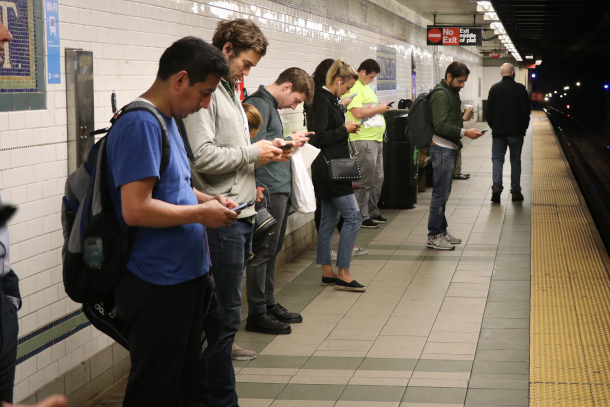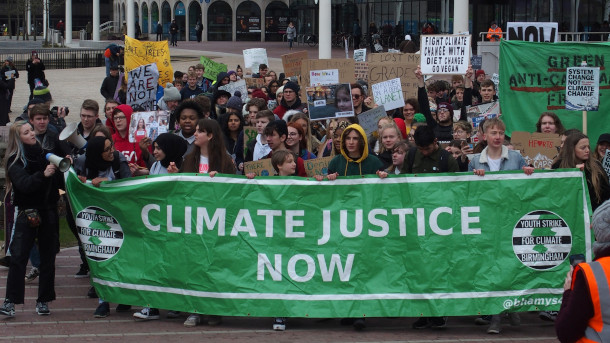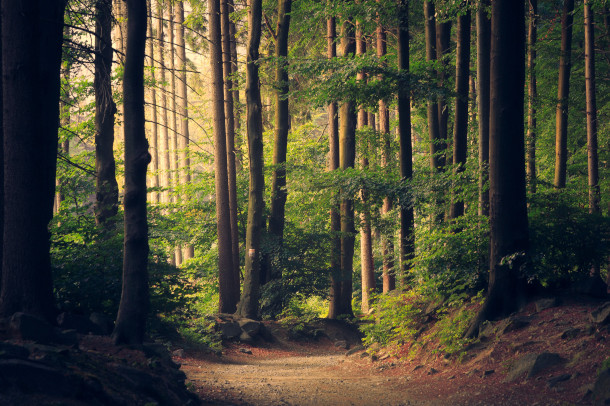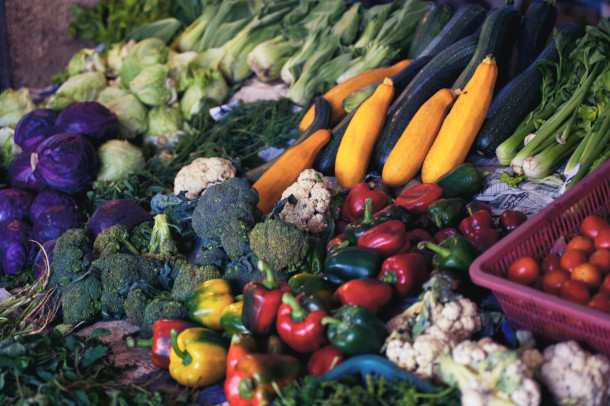Angry Birds and the People’s Climate Vote
Air Date: Week of February 12, 2021

Cassie Flynn, co-author of the UNDP People’s Climate Vote, drew inspiration to use gaming apps to deliver the survey when she saw almost everyone on subways playing on their phones. (Photo: Mussi Katz, Flickr, Public Domain 1.0)
Phone gaming apps meet climate policy through the work of the People’s Climate Vote, a survey conducted by the United Nations Development Programme. The survey gathered the responses of more than a million people from 50 countries, asking people how urgent they think the climate crisis is, and what policies they would like to see to tackle it. Cassie Flynn, co-author of the People’s Climate Vote, joins Living on Earth’s Jenni Doering to talk about the unique approach to polling, its limitations and how the survey can help leaders craft climate policy.
Transcript
BASCOMB: Now for a story about climate change… and Angry Birds.
[ANGRY BIRDS THEME SONG]
BASCOMB: That’s right, the mobile game Angry Birds. In perhaps the largest opinion poll on climate change to date, the UN used that popular game and others to reach 1.2 million respondents in 50 countries. 64% of them said they think climate change is a global emergency. The United Nations Development Programme ran what they call the “People’s Climate Vote” in high-, middle-, and low-income countries that together represent more than half of the world’s people. Notable exceptions to countries surveyed were China and South Korea. And using smartphone apps to reach respondents created significant barriers for people in lower-income countries with poor internet access. The creators of the survey say that despite its limitations, it yields insights into public opinion on climate change at a key moment when countries around the world are ramping up their pledges under the Paris Climate Agreement.
Cassie Flynn is a co-author of the People's Climate Vote survey and Strategic Advisor on Climate Change for UNDP and she joined Living on Earth’s Jenni Doering.
DOERING: So how did you come up with this idea to use mobile games like Angry Birds and Words with Friends to poll people all over the world on the issue of climate change?
FLYNN: Well, certainly when when you think about public opinion poll on climate, video games aren't the first thing that that you think of. But it comes from a place of really trying to reach as many people in the world as possible. And you know, in my work, I work with a lot of policymakers and a lot of ministers and heads of state, who are always really wanting to be very connected to the way people are thinking about how to solve the climate crisis. And that's what we really aimed to do with the People's Climate Vote, was to help people to really make their voices heard about how they see this, this being solved. And so it works like this. If somebody's playing a game, like Angry Birds, you know, you get those ads that pop up, and they're about 30 seconds long. And sometimes they're a game within a game and you can you can play it, or you can just wait and cancel it out when when it's time. We replaced that with a poll. And within that 30 seconds, we essentially asked people really two big questions. One was, do you think climate change is a global emergency? And then the second was, how do you want to solve it?

The UK Student Climate Network protesting the government’s lack of action at the Centenary Square, Birmingham, UK. The UNDP People’s Climate Vote collected responses from half a million people under the age of 18, a constituency that is typically unable to vote in regular elections. (Photo: Nick Wood, Flickr, CC BY-NC-SA 2.0)
DOERING: So Cassie, to what extent were there any results from this survey that really surprised you?
FLYNN: I think something that's really important out of this, and as I mentioned, you know, we really asked people just a few questions,. And one was, "Do you think climate change is a global emergency?" And then the other was, we gave people options for how they wanted to solve it. And we gave them essentially three of the biggest, most impactful policies across six different categories. So it was energy, economy, protecting people, transportation, farms and food, and nature. And what was really interesting about this is that people didn't pick just one or two. Like on average, they picked eight policies. And that is really amazing. Because what it tells us is that people aren't seeing, solving climate change as a silver bullet. They're not saying, you know, the one thing we need to do is climate friendly farming. That actually, it's climate friendly farming alongside protecting the ocean, alongside green jobs, alongside cleaner transportation. And this is really, really telling, that people really do see solving the climate crisis as a really broad-based, holistic, every-part-of-our-lives-needs-to-change kind of solution.
DOERING: Wow. I mean, of course, I wonder how much people are connecting the dots to some extent, because, you know, looking at the results, the policy that you had to promote plant based diets got, you know, the support of just 30% of respondents. That's compared to 54% for conserving forests and land. And I would note that conservation at the scale scientists say is really necessary, is really impossible without the world eating a lot less meat and dairy. So what does that disparity tell you about how people are thinking about these climate change solutions?
FLYNN: That's a great question. And we had, you know, two policies came down toward the bottom of the list, and one was insurance, and one was plant based diets. And I think there's a couple of things to think about. I mean, one is, we didn't ask people to vote against anything. And so it could very well be that on insurance or plant based diets, that people were just indifferent. The other thing is that people just may not know about these as being sort of big, big, broad brush things that that we need to do. And I think that there's a real opportunity for for education. There's real opportunity for helping people to understand what the link is. Why insurance matters after a category five storm hits. Why, you know, as you said, you know, we really can't solve this crisis without really thinking about how we eat and and what our diets are. The other part of it is that the way the question was worded was, what do you want your country to do? And so people may also have said, "Hey, a plant based diet is just something that I choose to do, I don't really need my country to do it. I don't really need my government to do it." So there's a lot of unpacking that we can still do that I think could really be useful in in really mapping out a lot of these solutions.

Out of 18 policies presented in the UNDP People’s Climate Vote, conserving forests and land was the most popular, with 54% out of 1.2 million respondents in 50 countries polled for the survey. (Photo: Lukasz Szmigiel, Unsplash)
DOERING: So there were some limitations to the survey, even though it was really pretty large by any standard, you know, 1.2 million respondents. But there were some gaps in representation. For example, Sub-Saharan Africa was barely represented in the data on whether the climate issue is an emergency. Just Nigeria and South Africa were represented there. And overall in the survey, China, which is the world's most populous country was, you know, missing. So why do these gaps exist? And how do you think that impacts the conclusions that we can really draw from the survey?
FLYNN: Yeah, well, you know, what's so interesting about this is that we saw really the digital divide in action. Gaming does reach, it has a reach that is that is so, so massive, but it doesn't have a reach toward communities that don't have an internet connection, or don't have access to a phone — all of the things that that you really needed to be able to participate in this. And and we saw this really vividly in some some communities. We saw this, in a lot of least developed countries, we saw this in a lot of the small island developing states around the world, that they just didn't have the strength of the bandwidth that that was necessary to be able to participate in this. And that's one thing that we're really trying to look at in terms of a phase two is, is how can we make sure that all of the people that are out there that want to participate in this can participate in this and something that we've we've really tried to focus on.
DOERING: So Cassie, how does the People's Climate Vote connect to the other work that your organization, the United Nations Development Programme, or UNDP, is doing on climate change?
FLYNN: So as we know that five years ago, in 2015, the world agreed to these 17 very ambitious goals, to alleviate poverty, to protect land and oceans, to have sustainable production and consumption, and tackle the climate crisis. And the program that I lead is something called UNDP's Climate Promise, which is the largest program in the world to support countries to develop and deliver their pledges underneath the Paris Agreement. Something that we noticed a lot was that they were very often asking for support for really making society feel like they own this pledge. That how do they, how do they include women and young people, indigenous communities, local groups? How do they make sure that they get everyone at the table?
DOERING: So what kind of a reception are you seeing so far from the international community and from governments around the world to this People's Climate Vote?

A policy to promote plant-based diets had the support of only 30% of the survey respondents, the lowest of all the mentioned policies. (Photo: Alexandr Podvalny, Unsplash)
FLYNN: Well, the response has been really overwhelming. I have to say, I woke up, the day that this was published. And I woke up to, you know, Greta had had tweeted about this, along with the G7 president had tweeted about this, along with a really famous guru had tweeted about this, and then it really snowballed from there. And we were so happy to see that this resonated. That this seemed to help coalesce voices around this crisis. And and we're hoping that this adds to this momentum that we need, because the decisions we have to make are massive. And when it comes to climate, doing something like transitioning toward renewable energy, or protecting people from category five storms, these are not small things. These are really really big decisions. And we're so happy to know that being able to coalesce people's voices around this and help deliver them to to world leaders has been very, very welcome. Many, many governments nearly every single government within the report, has really asked for a briefing on their information. We have, our phone is ringing off the hook about, you know, from governments saying, hey, we we saw this. We'd really be interested in knowing where our data came out what that looks like, and how we can incorporate it into into our climate pledges and just climate action in general. So it's been really, really encouraging, I have to say.
BASCOMB: That’s Cassie Flynn, Strategic Advisor on Climate Change for the United Nations Development Programme, speaking with Living on Earth’s Jenni Doering.
Links
Click here to watch the press conference on People’s Climate Vote
Living on Earth wants to hear from you!
Living on Earth
62 Calef Highway, Suite 212
Lee, NH 03861
Telephone: 617-287-4121
E-mail: comments@loe.org
Newsletter [Click here]
Donate to Living on Earth!
Living on Earth is an independent media program and relies entirely on contributions from listeners and institutions supporting public service. Please donate now to preserve an independent environmental voice.
NewsletterLiving on Earth offers a weekly delivery of the show's rundown to your mailbox. Sign up for our newsletter today!
 Sailors For The Sea: Be the change you want to sea.
Sailors For The Sea: Be the change you want to sea.
 The Grantham Foundation for the Protection of the Environment: Committed to protecting and improving the health of the global environment.
The Grantham Foundation for the Protection of the Environment: Committed to protecting and improving the health of the global environment.
 Contribute to Living on Earth and receive, as our gift to you, an archival print of one of Mark Seth Lender's extraordinary wildlife photographs. Follow the link to see Mark's current collection of photographs.
Contribute to Living on Earth and receive, as our gift to you, an archival print of one of Mark Seth Lender's extraordinary wildlife photographs. Follow the link to see Mark's current collection of photographs.
 Buy a signed copy of Mark Seth Lender's book Smeagull the Seagull & support Living on Earth
Buy a signed copy of Mark Seth Lender's book Smeagull the Seagull & support Living on Earth

